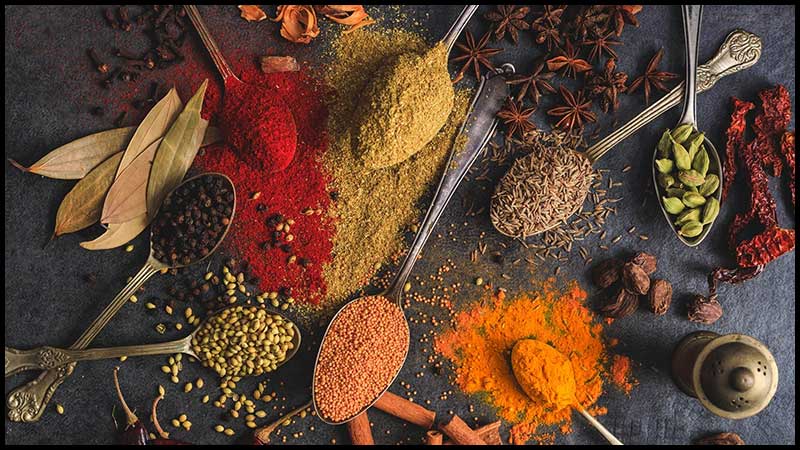Maintaining blood sugar levels is vital for preventing and controlling diabetes. Here are some spices that people with diabetes should add to their diet.
High blood sugar (glucose) is the most common cause of diabetes (both type 1 and 2). It happens when the body either can’t make insulin (type 1 diabetes) or can’t respond to insulin properly (type 2 diabetes). Insulin, a hormone produced by the pancreas, helps regulate blood glucose levels in the body.
According to Ayurveda, maintaining normal blood sugar levels is vital to prevent diabetes. This can be done with a combination of a healthy diet, regular exercise, proper eating habits, maintaining a healthy weight, consuming anti-diabetic superfoods, herbs, and spices on a regular basis. Ayurveda recommends consuming the below spices to control their blood sugar levels and manage diabetes. The benefits are also backed by scientific studies.
Many studies have shown that cinnamon can lower blood sugar levels by stimulating insulin activity. It also contains bioactive components that can help prevent and fight diabetes.
A recent study published in the Journal of the Endocrine Society found that cinnamon supplements helped lower abnormal fasting glucose levels in people with prediabetes and slow the progression to type 2 diabetes. The participants were given a 500 mg cinnamon capsule three times a day for 12 weeks. Add one teaspoon of cinnamon powder in a cup of warm water and drink daily for optimum results.
Fenugreek
Fenugreek (methi) seeds are high in soluble fibre that helps lower blood sugar by slowing down the digestion and absorption of carbohydrates and sugars. Thus it is often included in the diabetes diet.
A 2009 study published in the International Journal for Vitamin and Nutrition Research reported positive effects of fenugreek seeds on blood glucose and lipid profiles in Type 2 diabetic patients.
How can you consume fenugreek seeds? Soak it overnight and drink the liquid the next morning on an empty stomach. This is also an effective natural remedy for weight loss. Eat it as a sprout by adding it to a salad or grind the seeds into a powder and use it in making dishes.
Turmeric
Most Indian dishes are incomplete without turmeric. However, besides adding color and flavor to your meals, this common kitchen ingredient offers numerous health benefits. Turmeric has anti-inflammatory, antioxidant, anti-atherosclerotic, heart-protecting, and weight-reducing properties. Research has shown that curcumin, the active ingredient in turmeric, may be helpful in the prevention and treatment of diabetes and associated disorders.
In a 2013 review of studies, researchers claimed that curcumin can decrease the level of glucose in the blood, as well as other diabetes-related complications.
Curcumin can help remove toxins from the liver that come with excess alcohol. It may also help reduce symptoms of depression and arthritis and has the potential to prevent heart disease, Alzheimer’s, and cancer.
Garlic
If taste, odor, or spiciness is not an issue, adding garlic to your diet can benefit your body in many ways. Garlic may help reduce blood sugar by improving insulin sensitivity and secretion. A study published in the Pakistan Journal of Pharmaceutical Sciences reported that taking garlic supplements with standard anti-diabetic agents improved blood sugar levels in people with Type 2 diabetes. Sulfur compounds in garlic can also protect against oxidative damage and reduce high cholesterol levels and high blood pressure. Regular garlic consumption may also reduce the risk of heart disease, which affects approximately 80 percent of people with diabetes. Garlic is also a good source of vitamin C that also plays a role in maintaining blood sugar levels.
Ginger
This indispensable kitchen ingredient has been used in various home remedies to treat and manage health conditions since time immemorial. Ginger is Ayurveda’s most treasured spice used to treat common ailments like nausea and indigestion. But it can also help manage blood sugar levels and control diabetes. Studies have shown that eating ginger can help stimulate the production of insulin, a hormone that manages blood sugar levels.
An animal study found that obese rats with diabetes experienced a wealth of benefits, including reduced body weight after they were given a mix of cinnamon and ginger.
Another study published in the Journal of Complementary and Integrative Medicine found that ginger powder helped improve glycemic control in adults with type-2 diabetes who were not on insulin.
Cumin Seeds
Cumin seeds or jeera could also help manage diabetes by stimulating insulin production in the body.
A 2016-study evaluated the effect of 50 and 100 mg doses of green cumin essential oil in patients with type 2 diabetes. It found that Cuminum cyminum supplement (or cumin) could decrease the serum levels of insulin, fasting blood sugar, and glycosylated hemoglobin in such patients. Further, the spice helped control the complications of type 2 diabetes in these patients.
Simply consuming jeera water (jeera mixed with water) can benefit patients suffering from diabetes.
Important Notice: This article was originally published at www.thehealthsite.com by Longjam Dineshwori where all credits are due.









